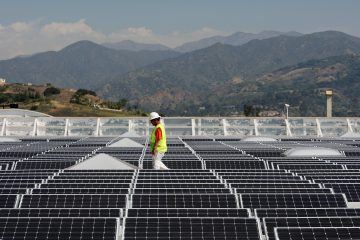 Kate Aronoff in TNR:
Kate Aronoff in TNR:
The government has been pretty kind to fossil fuel companies these last few months. Recent disclosures from the Federal Reserve’s secondary bond-buying program show that it has now bought $17 billion worth of ExxonMobil debt and $28.5 million from Energy Transfer Partners, the company behind the Dakota Access Pipeline. Private asset manager Blackrock oversees this purchasing program, among others.
Blackrock, with friends in both parties, is on the verge of becoming a fourth branch of government. Despite its pledge in early 2020 to recalibrate investment practices with climate change in mind, so far on behalf of the Fed it has seemed to offer up nearly unlimited public funds to bail out the world’s biggest polluters. These investments serve as a lifeline to a deeply troubled and increasingly unprofitable industry. Meanwhile, state and local governments—and the millions of people who’ll soon lose their unemployment insurance—have found bailouts much harder to come by. And hopes for a green recovery (which an increasingly large swathe of the Democratic Party supports to stave off depression and climate catastrophe) look alarmingly scarce.
A novel proposal gaining steam in Washington could address all of these problems. In a recent memo for Data for Progress, Cornell University law professor and financial regulation expert Saule Omarova proposed creating a National Investment Authority, or NIA. Modeled loosely off the New Deal-era Reconstruction Finance Corporation, the NIA Omarova outlined would contain two main bodies—a National Infrastructure Bank, or NIB, and a National Management Corporation, or “Nicki Mac”—to provide a lifeline to millions in the current crisis, jumpstart a green transition, and democratize the financial system in the process—a lender, guarantor, venture capitalist, and investment manager all rolled into one.
Democratizing the financial system, Omarova and others believe, is a crucial step toward enabling both the government and ordinary people to invest in a climate-friendly future.
More here.
